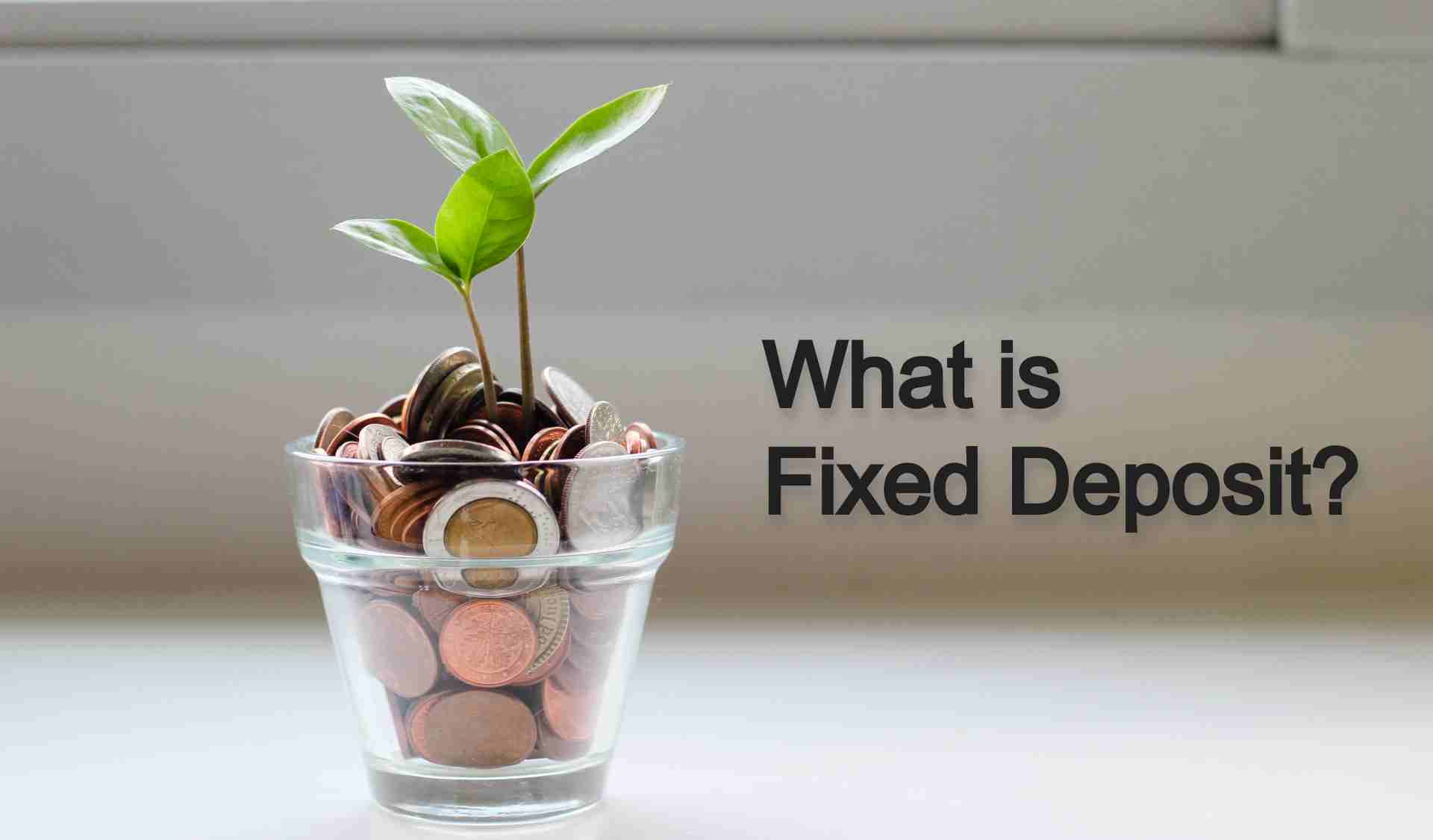What is Fixed Deposit?

Fixed Deposit is an investment scheme provided by banks where you invest a fixed amount for a specific period at a fixed rate of interest. The total returns contains invested amount with a compound interest return.There is assured rate of return in a fixed deposit investment. It is one of the most popular investment and a significant portion of savings options in India. Therefore, a fixed deposit investment becomes an ideal option for those who want assured returns with minimum risk factor.
Advantages:
- Fixed returns: One of the major reason for people to invest in fixed deposit is assured fixed return. Guaranteed returns at the end of the tenure. Investor can use a specific bank calculator to see the returns he will receive on investing a particular sum of money for a particular period of time.Your FD won’t be affected even if the interest rates fall in the stock market or commodity market. i.e. Your investment is secure irrespective of market situations.
- Flexible tenure: The tenure for a fixed deposit is flexible and banks allow customers to choose the duration of their fixed deposits. Usually, minimum tenure ranges from 7 days to 10 years. Fixed deposits are customisable to redeem or extend for the same period of time. Banks provide more than one fixed deposit accountto save for different goals.If someone is planning to save for long term, they can choose a fixed deposit for 5 years.
- Higher rate of return/interest: The interest rate offered on fixed deposits are higher than that on savings account. It is also a safe form of investment where returns are guaranteed. The rate of interest on FDs is higher than that on saving deposits. For example, Axis Bank offers 4% interest on saving bank accounts, whereas the minimum interest that a FD attracts is 5.5%.A savings account helps you earn interest on the balance maintained.The rate of interest on FDs are higher than that on savings accounts. It is also a safe form of investment where returns are guaranteed. If any bank offers 4.5% interest on saving account , then on FD, rate of interest will be around 5.5%. Some banks offer interest rates on FDs up to 7% or even more.
- Loans against fixed deposit: Instead of taking out an unsecured loan and paying a higher interest rate, you can avail a loan against your fixed deposit.An FD is helpful in case of financial emergencies. Taking a loan against a fixed deposit is very easy. You can take a loan up to 95% of the fixed deposit amount depending on the bank. Convert your fixed deposit into cash by taking loans.
- Tax-saving scheme: Most of the banks offer a tax-saving fixed deposit.This type of investment reduces your tax liability considerably. It comes under the Exempt-Tax-Exempt category. Although the interest earned on such FDs is taxable, you can claim a deduction of a maximum of Rs. 1,50,000 for the amount invested. However, the tax-saving deposits come with a mandatory 5-year lock-in period and cannot be withdrawn before that under any circumstances. Tax-saver FD attracts tax benefits under section 80C of the Income Tax Act, 1961.
- Compound interest is available: Investor can choose an FD with a reinvestment option,a matured FD amount for the duration of their choice. Benefit is that you will also earn interest on previous earned interest(interest on principle and interst earned).
- Benefit for senior citizens: Senior citizens get an extra higher rate of interest than public citizens.(usually higher rate of interest is >=0.25% ).Most of the banks and NBFCs follow this and offer higher rates to senior citizens.
- Flexible interest rate pay-outs: The tenure of FDs varies from 7 days to 10 years or more. Investor get an option of choosing Monthly,annually or at maturity interest as per their needs. Monthly and annual interest rate pay-out ensure that you have the extra income flow and can be reinvested for higher maturity benefits.
Disadvantages
- Locked in funds: Fixed deposits lock in funds for a fixed duration. These deposited funds will not be available for investor to use. Fixed deposits are not at all liquid and cannot be converted into cash easily.
- Penalties on withdrawal: On premature withdrawal of fixed deposits, Banks charge penalty to the depositors. This penalty is in the form of a reduced rate of interest.
- Fixed interest rate: Even though FDs have lots of advantages, the interest rate does not move in line with inflation. The fixed deposit interest rate remains the same for the entire duration of the fixed deposit. Even if the rates increase, the bank does not pay additional interest to the deposit holder. The deposit earns less than the inflation rate. Because of these, investors are losing their interest in fixed deposits.
Types of Fixed Deposits
- Standard Fixed Deposit : A standard fixed deposit requires a person to invest their money for a fixed period of time at a predetermined interest rate. The time period of a standard fixed deposit varies between 7 days to 10 years. This is the most popular FD option chosen by stakeholders.
- Special Fixed Deposit : Special Fixed Deposits are ''special'’ because they are usually offered for a special time period. A special time period can be between 290 days and 390 days. Special FDs offer a higher interest rate and are a popular choice among various stakeholders.
- Tax saving Fixed Deposit : Unlike the Standard Fixed deposits, Tax saving fixed deposits cannot be booked for less than a period of 5 years. The amount invested is exempt from tax under section 80C of Income Tax 1961, but the interest generated from the FD is liable to be taxed.
- Floating Fixed Deposit : In a floating fixed deposit, the rate changes quarterly or yearly and people can avail the benefits of a changing interest rate. The change in the rate of interest is determined by the Reserve Bank of India guidelines. For a really long time, Fixed deposits have been an attractive mode of investment for Indians over the years because of the security of the principal amount and how the money grows beside an assured rate of interest. It also gives people a regular source of income through interest, which they can either claim or reinvest. With banks offering better interest rates to their investors, fixed deposits' popularity will definitely increase with time.






